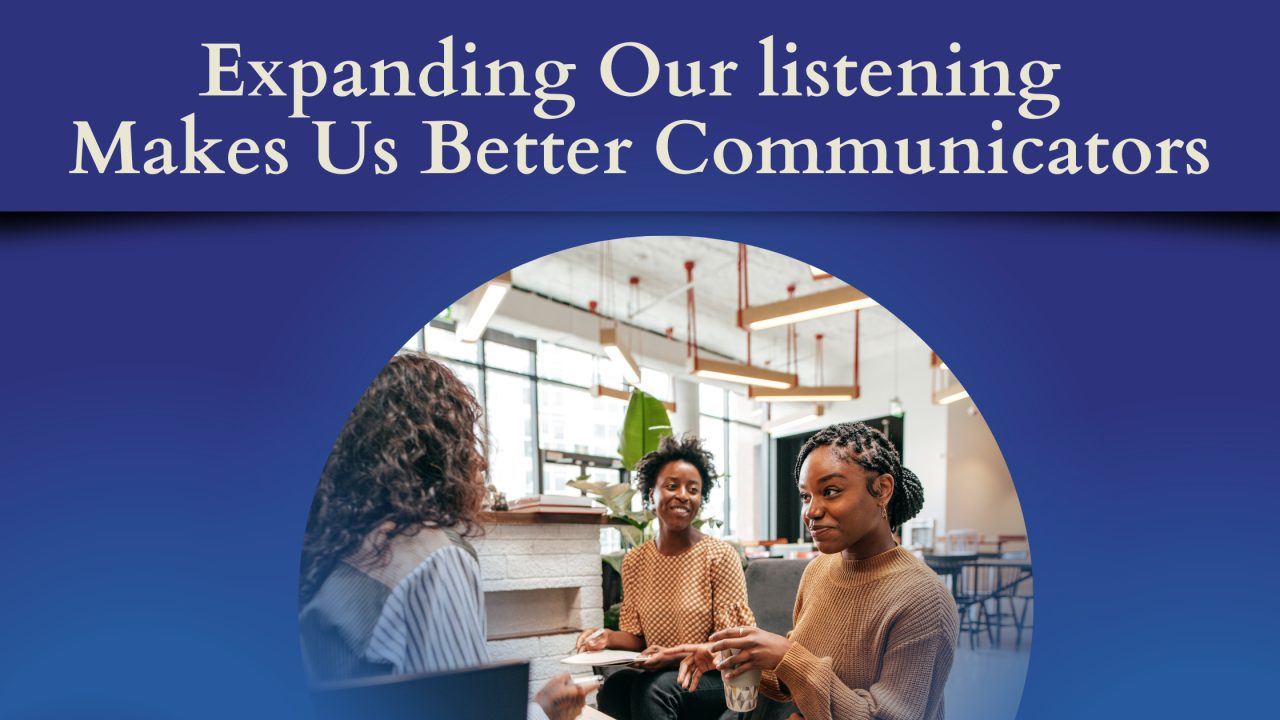(404) 793-0011 | drmaiysha@drmaiysha.com
Expanding Our listening Makes Us Better Communicators
Communication is the foundation of all relationships. While we often talk about watching our words, what we don't often talk about as much is watching our listening. Listening not only has an enormous impact on how we perceive things, but also it drives our responses and reactions (check out my podcast episode 134 "Listening Drives Our Behavior" HERE (https://spotifyanchor-web.app.link/e/Y6UEcrOGBvb).
Listening is not simply important for surface-level interaction; it has a more deeply ingrained impact on our subconscious mind. When we listen to others we are processing their communication at the conscious and unconscious levels. Similarly, when we speak and hear our words, they impact both our conscious and
unconscious minds. When we began to become more mindful of our listening, then we have the potential to be better partners, practitioners, and healers. Here are 6 things that will expand your listening:
1. Listen to the words coming out of your own mouth - The words that come out of your mouth or a direct representation of the thoughts happening in your head.. Have you ever been physically impacted by something someone close to you has said? Even more so, when you have received unexpected bad news or even unexpected good news, there's a physical initial reaction. While the words that we speak may not be able to physically hurt anyone, if we are not responsible for the words coming out of our mouths, we could create unintended injury without even realizing it. I don't mean to say that we should suppress our expression. Nor am I saying that we need to be responsible for someone else's interpretation of or reaction to our expression. I am simply saying that we could be cognizant of how our words impact the people we are speaking to so that we can be mindful that are speaking. We need to be not only responsible for our expression, but how that expression may land with others. I call this responsible speaking. In our NLP training, I teach my students how to be responsible speakers by teaching them tools to reframe their language before it leaves their lips.
2. Listen BEYOND the words coming out of THEIR mouth - similar to responsible speaking, there is responsible listening. Many people aren't always cognizant of what is coming out of their mouths, so by being a powerful listener we can begin to listen beyond the words that are being spoken to us. That doesn't mean we might need to read or make unnecessary interpretations. But when you are truly listening, you can not only get the communication that's happening verbally, but you can get all of the other communications that are happening but either support the verbal language or are incongruent with that that is being spoken. You can actually get the commitment behind the words that are being spoken by listening beyond just the words that are coming out of their mouth. When you become effective in responsible listening, then you can comprehend and get the world of another. One of the most foundational tools taught when my students attend my neurolinguistic programming training is listening beyond words.
3. Remember that the spoken word is only 7% of communication - In my podcast episode, "Everything is Communication" I talk about how everything we do... our words, our body language... our tone of voice is communication (LISTEN HERE). Have you ever been speaking with someone and noticed that the words that are coming out of their mouth are not congruent with their body language? When you listen beyond the words, you will begin to recognize the other 93% that you could be missing. This is one of the key skills people take away when attending our training.
4. First Seek to Understand - Ask questions before making suggestions - many times are listening to agree or disagree... to be right or wrong... to validate or invalidate. This makes us quick to give suggestions and recommendations before understanding where the speaker is coming from. Taking a pause and getting curious will allow you to connect not only with what the person is saying but also with the person themselves. Seeking to understand typically leads to the realization that many times we are in service of a common goal or desire.
5. Hold Empowerment as the goal - this really is the overarching thing. When we hold empowerment as the goal, we are more likely to listen beyond the words, seek to understand and be mindful of what we are saying to others, and of our body language. We are likely to be more congruent in our communication.
The bottom line is that listening is one of the most important skills one can develop when learning to communicate more effectively. One of the reasons neurolinguistic programming is so powerful is that it not only expands the listening, but it teaches you how to then use the full breadth of language available to connect and empower the people in our lives.
Master your inner voice, and help others do the same. Join our next Mind ReMapping NLP Mastery training and certification, and become a master communicator, learn trauma-informed coaching & consulting, and master the art of therapeutic storytelling. Schedule a free NLP Training interest call at www.remapmymind.today
Stay Informed
When you subscribe to the blog, we will send you an e-mail when there are new updates on the site so you wouldn't miss them.





Comments